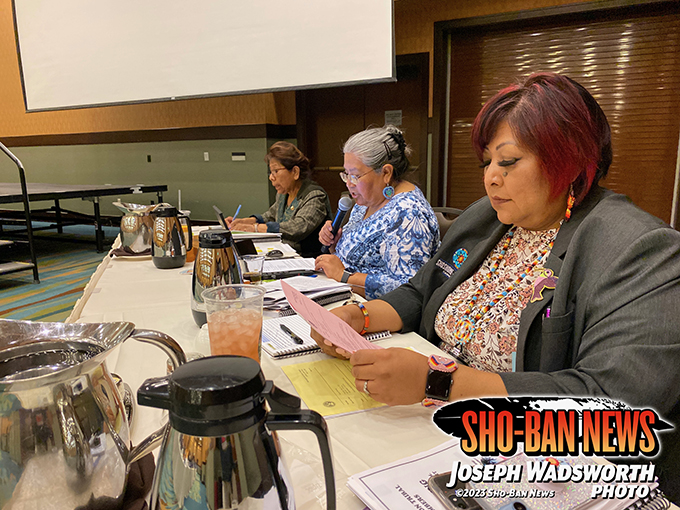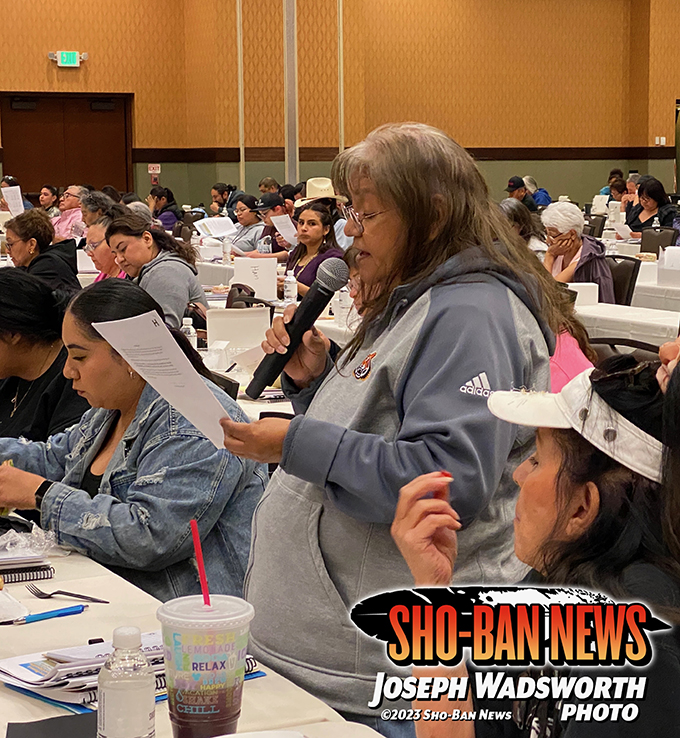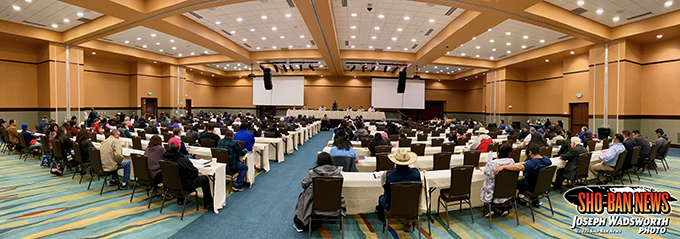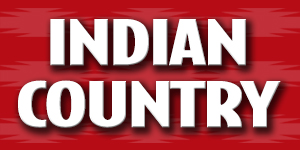Annual Meeting ends with enrollment discussion

Tribal administration staff reads past meeting minutes.
By LORI ANN EDMO
Sho-Ban News
FORT HALL — The afternoon session of the Shoshone-Bannock Tribes Annual Meeting continued after lunch when discussion occurred on proposed resolutions.
A quorum of 150 tribal members was reached at 11:16 a.m. to allow business to proceed.
A total of eight resolutions were submitted but only one was discussed because the quorum was lost at 1:47 p.m.
Resolution A was regarding tribal enrollment that Ferdinanda Shay presented. The resolution proposed putting a moratorium on enrollment until such time the general membership can discuss during a Called meeting to address the pros and cons. It provided Tribal Enrollment cease and desist until a Called Meeting is conducted to discuss the blood degree. The resolution called for the Fort Hall Business Council to cease and desist all enrollment and set up a meeting within 30 days and define the blood degree.
FHBC Chairman Nathan Small said the Tribes Constitution doesn’t provide for a moratorium and tried several times to do a Secretarial Election on enrollment. Gaylen Edmo, FHBC sergeant at arms, said it would be hard to see a moratorium. He noted it’s been done in the past but it doesn’t mean he agrees with it. “I’m not going to vote for a moratorium on a constitutional right.” Edmo said kaihitsi needs to be discussed because it’s not in the constitution but it’s in the ordinance.
Shay made a motion to approve the resolution and Zelphia Towersap seconded it.
Cecil Broncho said he doesn’t like the idea of disenrolling our tribal people who marry outside the Tribes.
Charlie Plentywounds said regarding the Fort Bridger Treaty, Chief Taghee spoke for all of the land. Charlie said our land is dwindling, the bloodline is mixed but the heritage is still strong. “We need to look to our momoatepe (ancestors) but have to look to the future.”

Ferdinanda Shay presents Resolution A.
LaNada War Jack believes the issue was resolved 2000 in a referendum vote but the council dropped it. She said tribal members have to marry other tribes, otherwise don’t want to make mistakes by non-Indians such as in Europe. She said the Tribes need to count other tribes blood degree.
Nancy Eschief Murillo noted there was a moratorium in August of 2012. In 1969 tribal members voted for one fourth blood degree that resulted in an ordinance that Bureau of Indian Affairs Superintendent William Mehojah approved. That stayed in place until 1996 when the general membership voted for descendancy. She also talked about a law passed in 1921 that said tribal members who take out their certificates of competency are stricken from enrollment rolls. Johnny Ballard was chairman at the time and Charlie Diggie signed as secretary.
Valerie Devinney said she told not to go with different people. She was enrolled in Wyoming but is now a Sho-Ban. She said the Tribes need to stick to rights and blood degree — stay at one fourth blood degree.
Marina Fast Horse said she don’t believe our ancestors back in the day would be enrolling non Natives. If people want a blood quantum then should be accepting other tribes to fill the bloodline. “My problem is enrolling all these taivos – over 2,000 that enjoy our hunting and fishing, housing.” She doesn’t think it’s fair. It’s non-Indians being enrolled, she continued noting we have to maintain our bloodline. She said that’s how she feels, consider other tribes, and she’s favor of one fourth.
Dan Ariwite – kaihitsi (end of the bloodline) is a Shoshone word and it needs something before or after or it doesn’t mean nothing. He said years ago Lemhi Shoshone kept their Indian blood for four generations. fifth generation the blood is diluted, they kept to that – that’s why they stayed Shoshone. To understand the teaching one has to be taught by grandfathers or grandmothers. In 1973 when the Lemhi Shoshone first came to this rez, they still practiced fourth generation. He said it goes back to Indian culture to be taught about fourth generation - fifth generation blood diluted out. When whites or doyataivos are brought in, it throws it off. He explained when people shot their arrow (took out certificates of competency) they got disenrolled but now maybe they’re getting enrolled under descendancy. He said enrollment made a mistake in 1972. Some get offended when called newetaivos. The word goes back until time immemorial.
When the quorum was lost at 1:47 p.m. Chairman Small said there could be a vote but it won’t be legal.
Willow Kipp said putting a moratorium puts a hindrance for those in progression with enrollment applications. She said what culture is based on, how create homes is everything comes from the land. “If we are marrying, all here in this place, if babies coming into enrollment, they need to be given a chance.” She said blood quantum comes from the federal government to bleed out our blood. She said by putting a cap on our kids, we are incapacitating ourselves. “Our culture comes from being here in this place,” she continued. Maybe have a culture or language requirement gathering to learn how to live in this space, she said.
Leslie St. Clair thanked Willow for saying what she said. She said what she learned with blood quantum, Indians are the only race of people who have to do this. The federal government established for us to fit their requirement because they want to terminate us — work to eradicate tribes.
St. Clair made a motion to adjourn the meeting but there was no quorum.
Chairman Small said because there was no quorum, the motion on the resolution fails or is lost. “We can’t finish it off,” he said.

Sho-Ban Tribes Annual Meeting attendees.
Small said the enrollment issue has been going on forever, there’s always been a discussion he noted the thing to do is to take the Bureau of Indian Affairs out of the approval process in the Constitution.
Adeline Matsaw believes the Tribes should set classes on tribal government because people don’t understand. The resolutions were discouraged. “It’s time for our people to learn what our ancestors went through to be here,” she said. Her grandchildren are not enrolled. Her daughter traveled from Boise to attend the meeting but it was a waste of time coming over here not being able to vote.
Louise Dixey said she’ been a proponent of tribal membership and in favor of a blood degree. She would like to see a secretarial election but because there are so many with less blood degree but it probably will get outvoted. She said the council can adopt ordinances that are law. One fourth degree was never challenged until a small group changed it. She said ordinances are the law and that’s what sovereignty is all about. Exercising our own tribal laws is the way our membership wanted. She appreciates our tribal government has been strong all these years. She asked what Pahsimeroi property was about? She noted it’s our responsibility to keep tribal government intact. “Hopefully we will have a secretarial election to change the enrollment requirements and put something in place.” She said she has a copy of all the people who shot their arrow but now their grandchildren and great grandchildren are getting enrolled. She encouraged to keep the land base intact and purchase land within the boundaries of the rez.
Small said Pahsimeroi is buying lands within the rez and quite a few tribal members purchased homes on fee land.
Darrell Shay said he disagrees with Louise’s position on enrollment. In 2017 the Tribes addressed issues such as the degree of blood and the ramifications of having it versus lineal descendancy. Kaihitsi will be true if go way they are. Concerning ordinances, we need to govern ourselves. He said he’s fortunate to learn the Shoshone language and the other part is our culture. “Have young people learn that, be Indian, understand Shoshone or Bannock. Learn cultural ways, the role of men and women, young boys and girls and learn to practice it.” He doesn’t agree with blood degree. “Have traditional and cultural knowledge but need to exercise it,” Shay said.
Council incumbents and candidates gave campaign speeches at the end of the meeting.





